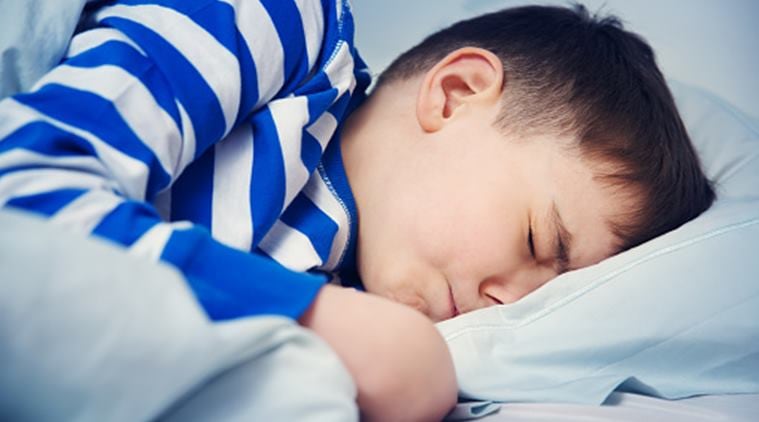To monitor how much sleep your child is getting, it's a good idea to switch off all gadgets an hour or two prior to bedtime and keep a sleep diary or calendar where you can track what time they sleep and awaken, and duration of daytime naps.

By Ritika Jain
New age problems like excessive media consumption and social media use can leave your brain feeling quite exhausted and can amount to a reduced attention span. Add to that anxiety over huge syllabuses and poor quality of sleep. It’s a really stressful time to be a student.
We know physical exercise plays an important part in the growing years. It supports physical and neurobiological development. Just like that, sleep too is directly linked with better academic performance and better emotion management. Sleep deprived children struggle more on school assignments or tests the next day, are significantly more tired and have a decreased ability to focus or concentrate. Medically too, they could develop problems with adenoids, tonsils or asthma. Kids who actively take up a sport spend more of their night in slow wave sleep, and less time in light or REM sleep. So it is advisable for parents to give children breaks to go out and play instead of cramming from books the whole day.
Dr Manvir Bhatia, a Delhi-based senior neurologist and sleep specialist says, “Believe it or not, memorisation and sleep have a deep connection. All that you learn and process during the day gets stored and consolidated while you sleep. Moreover, all stages of sleep are important. Some students use caffeine, energy drinks or other stimulants to stay awake for longer hours. It feels like a jumpstart to your nerves but in reality, doing this over long periods of time actually impairs retention. In addition, lack of sleep can give you mood swings and make you irritable, crave wrong kind of food and put on weight. I’ve met students who stay up all night only to draw a blank during exams. It can be a frightening experience.”
Many parents think 9 pm is the ideal bedtime but for elementary school kids, even that can be considered late. To monitor how much sleep your child is getting, it’s a good idea to switch off all gadgets an hour or two prior to bedtime and keep a sleep diary or calendar where you can track what time they sleep and awaken, and duration of daytime naps. It’s healthy for toddlers (1-3 years) to sleep for 12-14 hours every day. For preschoolers, it’s 11-13 hours. Younger children (5-10 years) need 10-11 hours and adolescents (10-17 years) need 8.5-9 hours of sleep. Of course, the requirement may change from time to time.
In adolescents, increased screen time has also been linked to insomnia and other psychological problems. The scientific reason for it is that artificial blue light emitted from electronic devices suppresses melatonin, the sleep-inducing hormone. This, in turn, interferes with the body’s natural clock. Interestingly, more and more teens are habituated to sleep loss that culminates into sleep debt but they’re hardly aware of it. Over time, sleep deprivation may result in anxiety and depression.
Did you know?
· A good amount of sleep promotes cell growth, leading to better repair in your body and building a strong immune system.
· Studies suggest that through the day, there’s an accumulation of substances in our brain that is known as ‘junk memory’. It’s important for your brain to clean up this memory on a daily basis to make space for the formation of new memory. This vacuum cleaning of sorts happens only during deep sleep. A good night’s sleep also boosts oxygen supply to the frontal cortex of your brain and thus improves your creativity.
· A section of the brain that controls aggression is known as amygdala. When you sleep, the activity in amygdala gets suppressed. So, an adequate amount of sleep is essential to keep your anger in check.
· Lack of sleep affects the insulin levels in your body and leads to a state of insulin resistance, leading to a higher risk of developing diabetes.
· People who stay up till late often end up with midnight cravings for carb-heavy foods, and in turn, find it more difficult to lose weight. Sleeping an adequate amount improves metabolism.
· Besides dark circles, loss of sleep can also cause pigmentation on cheeks and forehead. Better sleep will help your skin clear up.
Follow a good night-time routine. Here’s what can help:
· Make the child’s room sleep-conducive by creating a calm, relaxed atmosphere where the bed and pillows are comfortable, there is no external sound and the light is dimmed to suit the child’s comfort.
· Set the AC thermostat to a cool temperature (20-25°C). A warm room can cause you to wake up sweating.
· Get kids into the habit of bedtime reading rather than watching television.
· Eating large meals close to bedtime can cause delay in sleeping. Gastric trouble can also cause interrupted sleep.
· In case of small kids, bed-wetting can be avoided by using the washroom right before sleeping and avoiding liquids close to bedtime.
· Some medicines like cough syrup also may disrupt sleep. Find an alternative solution.
· Don’t worry if nightmares are the issue, assurance and hugs can soothe a child back to sleep.
If you suspect your child has a medical condition like sleep apnea (heavy breathing or snoring) or excessive daytime sleeping, do consult a doctor.
Also Read| Like Ashton Kutcher, are you struggling to get kids to sleep in their own beds? Try these tips
Source: Read Full Article





